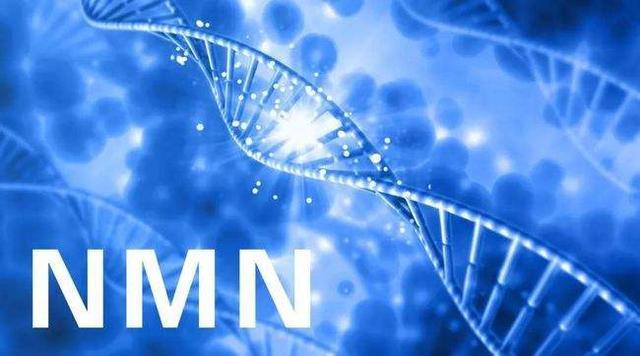New anti-aging hotspots: NMN = stem cells? Promoting bone growth and reducing fat production
In today’s constantly advancing life sciences, it can be said that the relatively popular cell technology is actually stem cells. Not only does it have a place in the treatment of difficult and complicated patients, but many celebrities are also using stem cells for health and anti-aging.
What is stem cell?
Stem cells are a type of cell with self replication ability and multi-directional differentiation potential. Under certain conditions, they can differentiate into various functional cells, known as “versatile cells” in the medical community.
In 2013, scientists from the Columbia University Medical Research Center successfully transformed human stem cells into functional lung and respiratory cells for the first time. This achievement can help scientists study lung development, build lung disease models, screen drugs, and ultimately produce transplantable lung organs.
Mesenchymal stromal cells (MSCs)
According to their differentiation potential, stem cells can be divided into: pluripotent stem cells, pluripotent stem cells, and pluripotent stem cells.
Mesenchymal stromal cells (MSCs) are one type of stem cells that can differentiate into various cell types, such as osteoblasts, chondrocytes, and adipocytes.
The flexibility of these cells contributes to the widespread clinical application of MSCs in tissue repair.
However, there are still challenges in the effective cell expansion of MSCs for stem cell therapy.
Research on NMN&MSCs
Although “stem cell therapy” is relatively immature, a research paper published in the Nature journal in 2019 mentioned that nicotinamide mononucleotide (NMN) can activate Sirtuin-1 (SIRT1), upregulate SIRT1 to increase MSCs’ osteogenesis and reduce adipogenesis. This discovery provides new ideas for stem cell therapy for bone diseases such as osteoporosis.
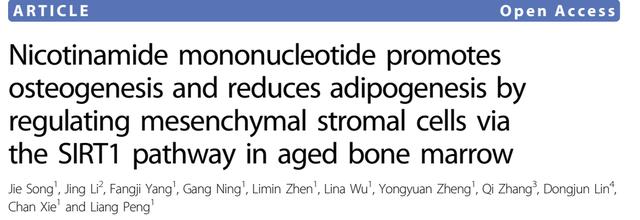
NMN promotes in vitro and in vivo amplification of MSCs
In the experiment, researchers used mice as experimental subjects and observed the effects of different concentrations of NMN on the colony forming unit – fibroblasts (CFU-F).
The results indicate that as the concentration of β-Nicotinamide Mononucleotide increases, the frequency of CFU-F also increases correspondingly and reaches its maximum value within a certain range.
To further investigate whether β-Nicotinamide Mononucleotide can stimulate the expansion of MSCs in vivo, researchers analyzed the immune phenotype of mice treated with NMN.
They found that after 3 months of NMN treatment, the frequency of MSCs increased compared to the control group, and in addition, the frequency of specific stromal cells also increased.
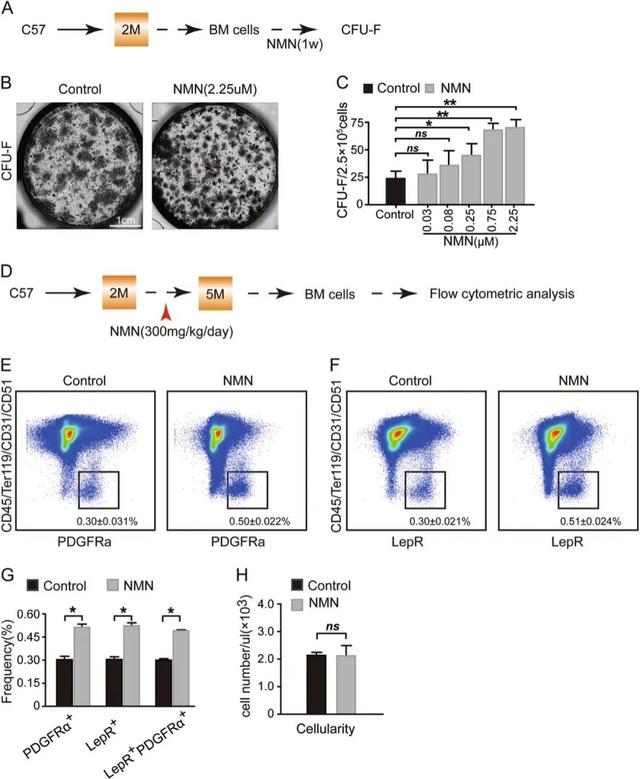
NMN promotes osteogenic differentiation and reduces fat production
To investigate the effect of NMN on the differentiation of MSCs in vitro, researchers used NMN to induce CFU-F colonies to differentiate into osteoblasts and adipocytes.
Through observation, it was found that as the concentration of NMN increased, the proportion of osteoblasts was significantly higher than that of the control group, while the proportion of adipocytes decreased accordingly.
Researchers also found through an analysis called quantitative polymerase chain reaction (qPCR) that in cells treated with β-Nicotinamide Mononucleotide, the expression of a gene called RunX2 and a gene called Wnt4 increased, while the expression levels of the other two genes, one called Pparg and the other called Adipq, decreased.
These results indicate that NMN promotes osteogenic differentiation and inhibits adipogenesis by regulating the expression of key transcription factors.
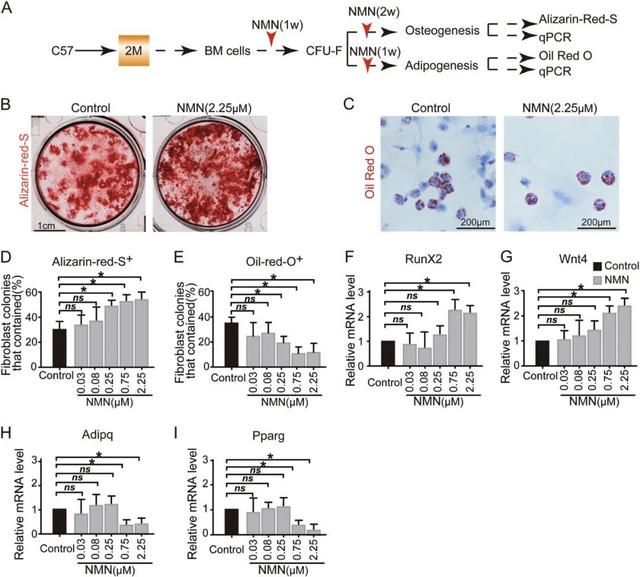
NMN does not alter bone lipid balance
To further investigate the effects of NMN on in vivo osteogenesis and adipogenesis, researchers administered NMN to 2-month-old mice for 3 months. The results showed that compared with the control group, the thickness, bone volume, and bone area of the femoral cortex and trabecular bone in mice treated with NMN did not change.
Similarly, in fat related experiments, they did not find significant differences between NMN treated mice and the control group.
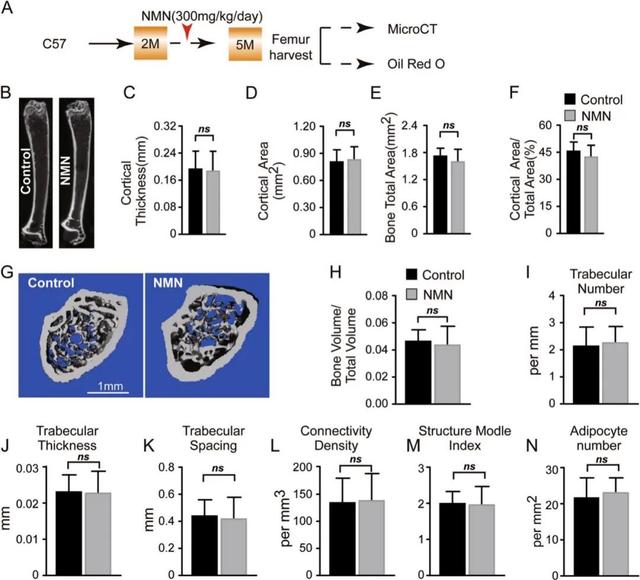
NMN promotes bone formation
When mesenchymal stem cells (MSCs) in the bone marrow abnormally transform into adipocytes instead of forming bones, the bones damaged, leading to osteoporosis and aging.
To investigate whether NMN can improve this situation, researchers injected older people mice with NMN. Through micro CT scanning analysis, it was found that β-Nicotinamide Mononucleotide did not alter the main structure of mouse leg bones, but did increase the number, thickness, and connectivity of trabecular bone within the bones, which is an important indicator of bone strength.
Meanwhile, NMN also reduces the gaps between trabecular bones, making its structure more compact. Although there was no significant change in overall bone mass, these results indicate that NMN can stimulate bone formation in aged mice.
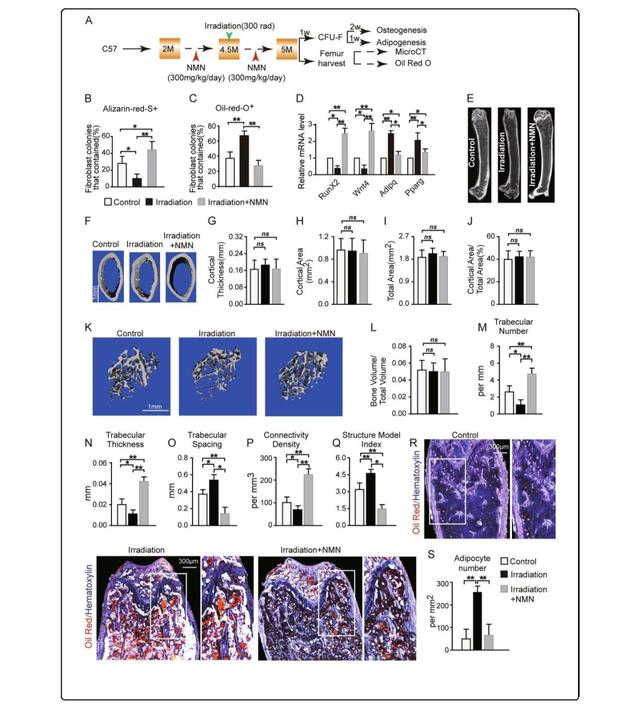
NMN regulates mesenchymal stem cells to affect bone and fat formation through SIRT1 regulation
By studying the mesenchymal stem cells of 12-month-old and 15-month-old mice, as well as overexpressing SIRT1 in Prx1 gene knocked in mice, researchers found that NMN can enhance osteogenic ability and inhibit adipogenic ability.
These results indicate that NMN regulates osteogenesis and adipogenesis of mesenchymal stem cells through SIRT1, providing new insights for bone health and anti-aging research.
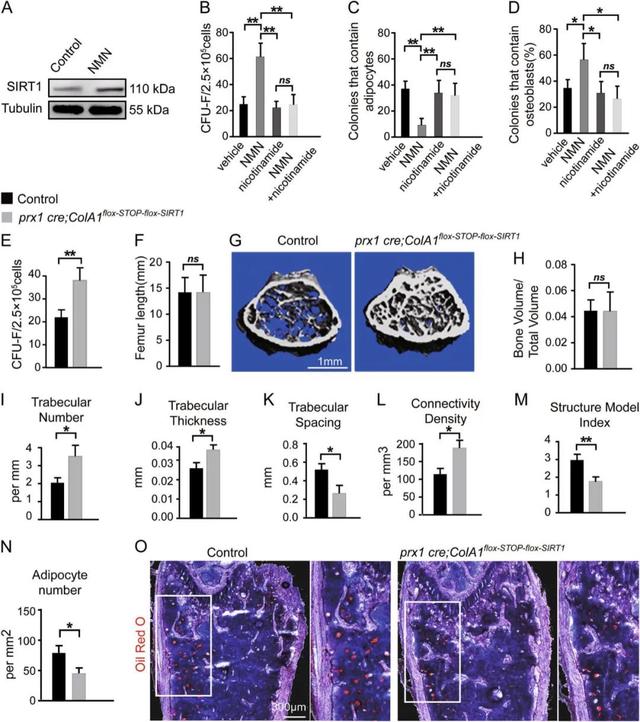
Reference:
[1] Song J, Li J, Yang F, Ning G, Zhen L, Wu L, Zheng Y, Zhang Q, Lin D, Xie C, Peng L. Nicotinamide mononucleotide promotes osteogenesis and reduces adipogenesis by regulating mesenchymal stromal cells via the SIRT1 pathway in aged bone marrow. Cell Death Dis. 2019 Apr 18;10(5):336.

